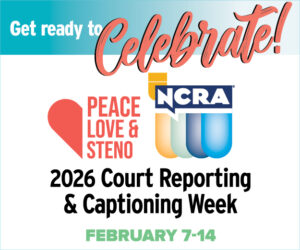By Chris DeGrazio
“Overwhelming” is how Jenna Hinkle, an official from Colorado Springs, Colo., describes her first year of reporting. But she has some advice for students and other new professionals: “Be kind to yourself. Don’t let the anxiety and fear outweigh your excitement, because there will be people everywhere who just want to help you.”
JCR | How did you get interested in court reporting?
JH | I had a degree in music performance already but realized I wanted to go in a different direction after having an arts administration job for a while. I have an interest in true crime and was thinking about furthering my education in a criminal justice field, but after doing some research with the help of my mom, I landed on court reporting.
JCR | Why did you choose to become a court reporter or captioner?
JH | I chose to become a court reporter because I am fascinated by it; it challenges me; and honestly, it pays well. Entry level, I am making much more than many of my friends who have been working for years in their field.
JCR | What’s something you’ve learned in your first few months of reporting?
JH | That you will never feel prepared to start working. The first time I sat on my own in a courtroom, my hands were shaking, my palms were sweaty, and frankly, I was terrified. But you are not alone. My fear is outweighed by the constant support from my colleagues, and there is not a single question that I am discouraged from asking, even the simple ones like where a courtroom is in the building. I’ve also learned that in some ways it’s easier than I thought. There are people who will speak slowly and give you a much-needed break, and the judges are all incredibly supportive and will do whatever is necessary to help you produce a good record.
I have an inside look into our criminal justice system, and that isn’t something most people ever get to experience.
JCR | What do you enjoy most about court reporting?
JH | Everything, to be honest. As cheesy as it sounds, I feel like this is my calling. I can sit through four hours of hearings on a docket and not feel bored. I am pretty introverted as well, so I enjoy spending most of my day not talking to anyone, just sitting there and listening. It’s challenging, and it keeps my brain fresh. It feels good to be a part of something so important, too. Again, so many things I love.
JCR | How did you feel both going into your first assignment as a reporter and coming out of it?
JH | I felt absolutely terrified, honestly. When the responsibility was solely mine for the first time, the weight that I felt was no joke. However, when I came out of it, I realized that I am capable of doing the job. I had drops and missed a few things that were said, but I know that with time those mistakes will lessen more and more.
JCR | What’s the coolest experience you have had working in the profession?
JH | Sitting in on some of the most fascinating cases. I haven’t covered a whole lot by myself, but I have seen a lot already. Our courthouse only covers criminal cases, so every day I come in I know I’m going to learn and see something different. I have an inside look into our criminal justice system, and that isn’t something most people ever get to experience.
JCR | If you could sum up your first year in one word, what would it be and why?
JH | “Overwhelming,” because it is, and that’s okay. Sometimes it was overwhelming in a bad way, and sometimes it was in a good way because I just couldn’t believe I was working where I was. It’s like drinking water through a firehose learning all the information you need to get through your first period of reporting.
JCR | What was the hardest part of transitioning from school to the real world?
JH | The speed, in many ways. In our jurisdiction, people regularly speak at speeds far faster than the 225 we’re trained to do. It’s also difficult to transition from a judge who is speaking at 100 words per minute to an attorney who is speaking at 300 in a split second. When we’re so used to dictations that do not vary in speed even a little bit, it’s very difficult and I describe it as getting whiplash.
JCR | Do you have any advice for reporting students?
Keep going. It is so discouraging for many people to fail so much. But you can only fail forward and upward. I am quite the perfectionist and got mostly A’s in school up until I became a reporting student. To suddenly start failing often and HARD was really scary, but I kept pushing through. The practice is really worth it, but so is the rest. Do not work yourself too hard. Some of my best breakthroughs in speed came when I took a few days or even a week off from practicing.
JCR | What’s your “can’t live without” item in your steno bag?
JH | A pen and paper. I am constantly writing notes to myself to help me remember attorneys’ names or briefs for the particular session I’m covering. For example, I have a page covered in briefs for a homicide case.
JCR | Do you have a mentor?
JH | I have many. That is one of the amazing parts of working as an official. There are 13 other people doing the same job as me that I can ask questions of. Two reporters specifically have taken me under their wing and they’re constantly sending me cheat sheet emails filled with briefs and procedures and have even called me to help me through things on their days off. Shoutout to Ashley and Jess!
Taking care of yourself outside of work is crucial to your success at work, so I just make sure to take time off and do what I need to protect that, even if it means working late into the night so I cannot look at my machine or computer for a whole weekend.
JCR | Who or what inspires you?
JH | So many people. When it comes to court reporting, my main professor at [Alfred State College in Alfred, N.Y.], Danielle Green, was always encouraging to me. She answered any questions I had and bestowed her wisdom upon me any chance she got. I am also inspired by a freelance reporter I did much of my internship with, Cindy Elliott. Now I am inspired by my colleagues at the courthouse. They are powerhouses and women that I believe are some of the most talented and intelligent people I have ever known. It’s certainly also inspiring to see the financial success that many reporters have achieved in this profession. Financial security is something I would very much like to have, and that is something that really inspired me to get through school and start my career.
JCR | What do you do to remain positive and motivated?
JH | I joined groups like Encouraging Court Reporting Students on Facebook, joined the challenge that Chris DeGrazio runs on Facebook Messenger called “90-Day Test Challenge” to keep testing even when I really didn’t feel like touching my machine that day, and I joined a group chat with my fellow classmates at Alfred State. It was nice to vent and share both our plight and advice and encouragement in a forum of people who were going through the same things as I was. It also helped to focus on something that I could award myself with. For example, when I finally passed my 160s I went out to dinner with my partner and took a night off to just watch movies and hang out. Silly, but effective.
JCR | How do you maintain a healthy work/life balance?
JH | I get as much done during my workday as I can and reach out for help from my boss and colleagues if I ever need it. They are incredible teammates, and we all support each other when we need a little relief. Taking care of yourself outside of work is crucial to your success at work, so I just make sure to take time off and do what I need to protect that, even if it means working late into the night so I cannot look at my machine or computer for a whole weekend.
JCR | What is your next goal? What is a long-term goal?
JH | My next goal is to pass the RPR and become a “certified” reporter. My long-term goal is to just get faster and more accurate. Realtime is crucial in our state and is expected by most judges in our courthouse.
This interview has been edited for length.
Jenna Hinkle is an official from Colorado Springs, Colo. She can be reached at jennakhinkle@gmail.com.
Chris DeGrazio is a freelance reporter in Fort Pierce, Fla. He can be reached at sokhacambodian@yahoo.com.



